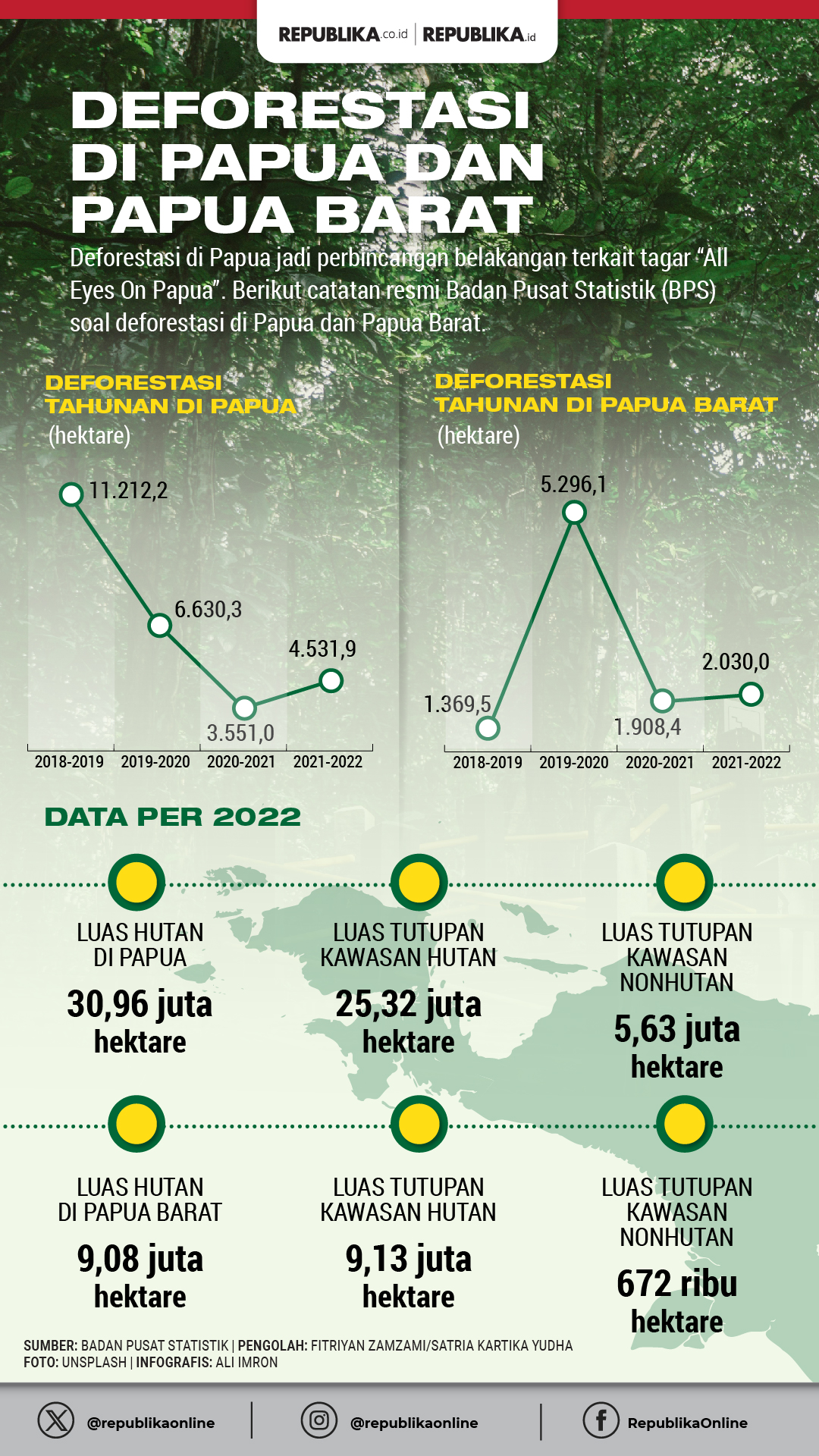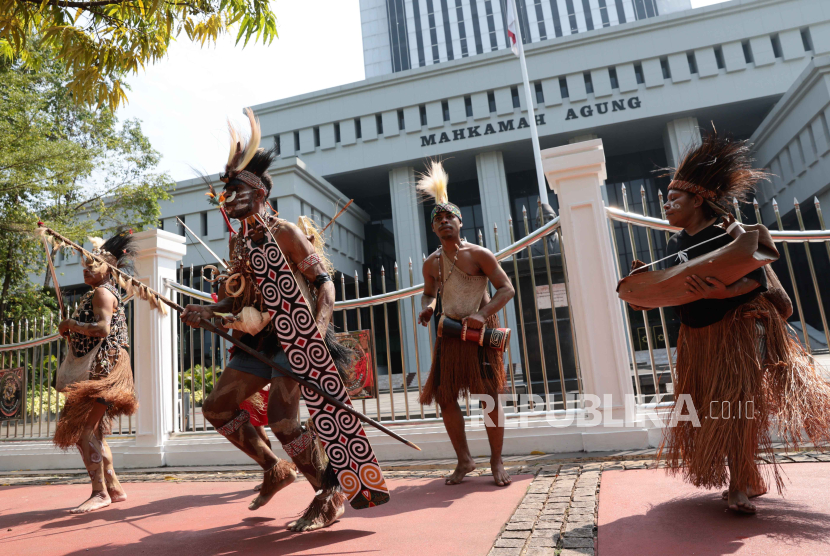REPUBLIKA.CO.ID, JAKARTA -- The meme “All Eyes on Papua” still paints the lines of the past social media as a form of support to the indigenous Awyu people of South Papua and the Moi tribe in West Papua. Nowdays, the struggle of the indigenous Awyu and Moi tribes to protect their forests in southern and southwestern Papua is in the hands of the Supreme Court (MA).
The Awyu and Moi tribes hope MA can grant a cassation motion to cancel the environmental permit of a palm oil company suspected of violating the rules. Franky Samperante, Executive Director of the Bentala Folk Heritage Foundation, who helped to monitor the struggle of the Awyu and Moi tribes, explained the issues related to conflicts between indigenous peoples and palm companies. Awyu indigenous people sued the local government for issuing an environmental permit for PT Indo Asiana Lestari (IAL).
PT IAL holds an environmental permit covering 36,094 hectares or more than half the area of Jakarta, and is located in the indigenous forest of the Woro clan, part of the Awyu tribe. However the suit ran aground in the courts of first and second instance. Now, cassation in the Supreme Court is the remaining hope of preserving indigenous forests.
“The dispute right now is at the stages of the process, the requirements (companies) get permission. For example, what we asked yesterday is that if a company wants to obtain a permit, it must consult with the community regarding their proposal to develop a plantation business,” Franky told Republika late last week.
Franky explained that the deliberations determined the agreement whether the public approved or disapproved of the company's plan. According to him, most of the public disapproves, but he also acknowledges there are some approving societies.
“We are the group that is opposed to the company's plans that suspect there is a game. For example, the game in question is the awarding of a certain amount of money to a part of the community to support a company's plan,” he said.
Although it did not get permission from the majority of the public, environmental permits eventually stayed out. “People didn't even know there was a permit for the location. It turns out that the local government, namely the One-Stop Integrated Capital Planting and Licensing Service (DPMPTSP) has issued an environmental feasibility approval that we recognize as an environmental permit,” he added.
Environmental permits consist of Amdal (environmental impact analysis), environmental management efforts, and environmental management plans. “The community is guilty of that. Awyu sued it to one company PT Indo Asiana Lestari. Before being sued, first-first we also made a public information request because we needed a hearing letter. When we heard about the environmental permit, we tried to apply for it.”

“But DPMPTSP doesn't deliver. We made a complaint to the Papua Provincial Public Information Commission. We complained to the provincial government but then it was rejected. That we brought to PTUN related to the environment,” he said.
At the end of May, the Awyu and Moi tribes came to the Supreme Court building in Central Jakarta. Through this peaceful action, the indigenous Awyu and Moi tribes hope that the Supreme Court will strike down the law that protects their indigenous forests.
Citing the website of the Ministry of Environment and Forestry (MOE), the preparation of the Amdal document should be done by involving the directly affected communities in the business plans and/or activities, but still open space for environmentalists and NGOs that foster the affected communities.
Community involvement has also been affirmed in Law No 11 of 2020 on Job Creation. Article 25 states that the Amdal document must contain input suggestions as well as the responses of the directly affected communities that are relevant to the business plan and/or activity. Then article 26 confirms that the preparation of the Amdal document is carried out with the involvement of the people directly affected by the business plan and/or activities.
In its press statement, Green Peace Indonesia said that in addition to the appeal of PT IAL's case, the indigenous people of Awyu are also filing an appeal against the lawsuit of PT Kartika Cipta Pratama and PT Megakarya Jaya Raya, two palm companies that have also been and will expand in Boven Digoel.
PT KCP and PT MJR, who had previously lost in PTUN Jakarta, appealed and were won by the judges of the High Court of TUN Jakarta. “We don't know yet whether it has been a hearing (of cassation in the Supreme Court) or not. Usually they are hearings but not hearings in court but deliberative hearings of a panel of judges. That's what we haven't heard when the deliberations are,” Franky said.
The issue of indigenous forest communities in Papua is of concern to Vice President KH Ma'ruf Amin. The Vice President emphasized that there must be communication between the regional government, traditional heads and the community in the development process. "So that there won't be any kind of conflict or misunderstanding like what has happened so far," said the Vice President during a visit to Sorong City, West Papua, Thursday (6/6/2024), as quoted from the official website of the Vice Presidential Secretariat.
The Vice President emphasized that Papua's future development plans must involve indigenous communities, especially tribal chiefs. This is necessary to avoid policies that have a negative impact on the livelihoods of indigenous Papuan people. "To the regional leaders, to the Acting Governors, we hope that's the case," he stressed.
Regarding the lawsuit by the Awyu tribe and the Moi tribe which has now reached the cassation stage at the Supreme Court, the Vice President hopes that the process can proceed in accordance with the provisions of the court. He warned that something like this should never happen again.
“But in the future, we hope things like that don't happen. "Because maybe in the past there was a lack of communication, in the future we have to communicate well," said the Vice President.


